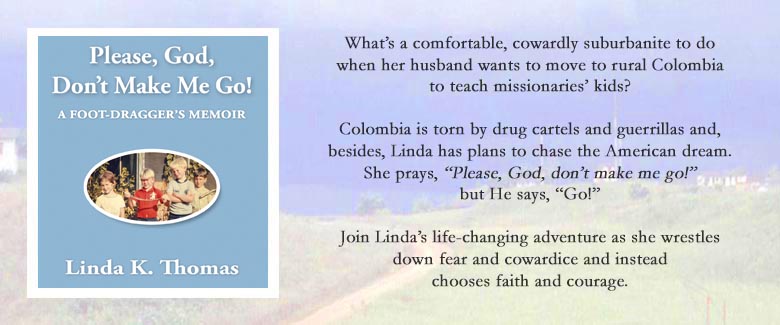The
next morning, our first morning in Lomalinda, we awoke to a swishing, whooshing
noise outside. Dave got out of bed to investigate.
I
sat up, my heart singing because of the sun beaming through the windows—a
luxury for Seattle natives.
I
peeked through the curtains. Bent low to the ground, a local Colombian swung a
machete, shearing grasses in our yard.
Dave
knew only enough Spanish to say buenos días (hello), but
he stepped outside and struck up a conversation. Manuel had a ready smile, bright
white teeth, bronzed skin, and hair as black as the Colombian midnight sky.
A
flock of birds flew overhead—raucous, squawking green parrots. We soon learned
those calls would greet us every morning and again at the end of each day.
My
precious little kids tiptoed out of their bedrooms rubbing their eyes, looking
around the house, looking at me, looking at each other, looking as if they felt
like I so often did—Where am I? . . . Oh, now I remember. . . Lomalinda.
Outside,
Manuel continued to stoop over and swing his machete. His back must have ached something
awful.
Minutes
later the vast eastern sky loomed gray and soon turned pewter. It was as if we
were living Isaiah 41:22, “God sits enthroned above the circle of the earth. .
. . He stretches out the heavens like a canopy, and spreads them out. . . .”
Soon,
sharp wind gusts forced shrubs and palms and bamboo to bow westward. The
heavens grew black, and a blast of wind whipped the curtains off our living
room windows.
Dave
invited Manuel into our screened-in porch and, while they watched the
turbulence approach, Manuel taught him that rain is lluvia, and the big storm a
chubasco.
Then
it hit. Rain pounded our roof, hard and fast, and we had to shout if we wanted
to hear each other.
Rivers
gushed off our roof and, even though our house had wide eaves, rain blew inside
through the glass window slats. We could only gape in disbelief—we’d never seen
downpours like that in Seattle.
In
half an hour the storm had blown beyond us, leaving thick layers of mud in our
yard, our drive, our road—everywhere, everywhere—and for the rest of the day,
our shoes brought it into the house, orange and sticky.
It
had never occurred to me that in Lomalinda
we’d
have to live without pavement.
(from
Chapter 7,







